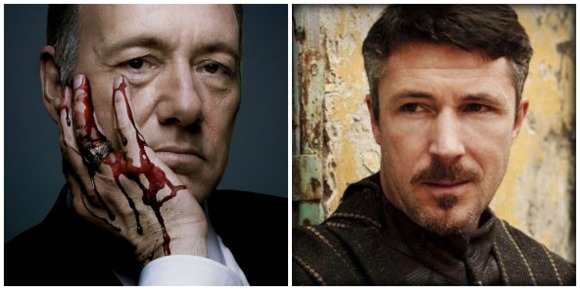Lately I’ve been obsessing over two TV dramas: House of Cards (which has two seasons out on Netflix and if you’re not watching it right now you should be) and Game of Thrones (which is in its fourth season on HBO and if you’re not watching it right now you should be).
They’re both political dramas, although Game of Thrones is set in a fantasy world while House of Cards is set in good old Washington, DC. Let me get one thing straight: I do not care about politics. I don’t understand most of politics. The very word “politics” is boring to me. But these two shows are not just about politics. They are about manipulation, psychology, and (best of all) psychosis. They are about bad people doing terrible things for their own gain, and yet we tune in over and over again because we JUST HAVE TO KNOW what’s going to happen next.
One of my favorite characters on Game of Thrones is Petyr Baelish, or Littlefinger. I recently referred to him as “the Frank Underwood of Westeros.” Frank Underwood is the main character on House of Cards. It had just occurred to me at that moment how similar they are.

Both of these guys are ruthless. They both want all of the power, right now, and will do whatever it takes to get it. But they’re not rash – they both have well-thought out plans, complete with backup plans, and backup-backup plans. Often, you think they’ve been foiled, only to find out later that they were just playing the other characters like well-tuned instruments.
Both of them have done (and will, I’m sure, continue to do) horrible things. Often, they’re doing these things to other characters who are genuinely likable. And yet…I still love both of these characters. I bafflingly, disproportionately, love them.
Is it just that I have a fondness for the character who somehow knows all, sees all, and masterminds all? For the guy who is always three steps ahead of the other guy, somehow even leading that other guy by the nose, making him think he’s making his own decisions, and then BOOM. Sorry, other guy.
I used to think I loved the Christ-figure – those Gandalfs, Dumbledores, and Aslans. They are also seemingly omniscient, and willing to make the ultimate sacrifice for the good of everyone. They are good guys, and they often come back to explain their sacrifice, to commend others for their sacrifices, and to bring the whole thing together in a happy (ish) ending.

Was it just that I hadn’t yet been introduced to the anti Christ-figure (not the “anti Christ”-figure, I want to be clear about that – just the anti- “Christ figure”) that I didn’t realize how much more interesting these characters could be? I mean, I cheered when the deceased Gandalf the Grey came back as Gandalf the White, sure I did, but was it really so surprising?
The good guy is more predictable than the bad guy. And the Christ-figure is the most predictable at all. We pretty much know the life lesson we’re going to learn from those guys. Stand up for your friends. Do unto others. The only thing we have to fear is fear itself. Love conquers all. Do the right thing. Stand your ground in the face of evil. Don’t give up on good. It’s kindergarten stuff at its core, whether you’re facing down the White Witch or the cyber bully or He Who Must Not Be Named.
The bad guys – the anti Christ-figures – are infinitely more interesting. What BS crazy thing are they going to do today in the name of getting one rung higher on the power ladder. They wouldn’t possibly – no one could – OMG DID YOU SEE THAT??
I never had that reaction to Aslan allowing Jadis to shave and humiliate him, I’ll tell you that.
So today I’m singing the praises of the guy who’s in control, the guy pulling the strings behind the curtain, the guy looking out for numero uno, even when it means stepping all over numeros dos through ciento. Because he’s keeping things interesting. Let’s give that guy a round of applause. (Just as long as he stays on our TV screens, fictional, and far away.)